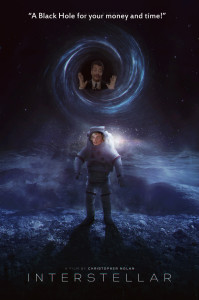Interstellar — A Journey To Nowhere
Having just returned from the Arclight Cinemadome, having watched Christopher Nolan’s three-hour love letter to Stanley Kubrick on a ghetto-IMAX 70mm screen, I am resisting the urge to tear it apart. After all:
- I am a huge lover of ‘hard’ science-fiction. Crafting a subtle post-apocalyptic United States that is slowly succumbing to the mistakes of agri-business and failures to address climate change were such logical extensions of our current reality that my girlfriend was loathe to call the movie science fiction. This is a victory in and of itself for ‘hard’ sci-fi — that is, crafting a future based on the given conditions of current life on current Earth.
- I recognize the need for the number one movie in America to be a non-comic book-based, non-recycled script, that actually deals with pressing issues of the day and, as a bonus, gives the pop-centric moviegoing public a basic literacy of relativity theory.
- I, like the Nolan brothers, found 2001 to be a tremendous influence on my mental scale of the universe.
- I am duly impressed at any attempt to craft a sci-fi blockbuster that completely avoids Will Smith trope traps (mechanical spiders, killer hordes of nanny robots, an alien planet that is really Jurassic Park).
For all of these things, the Nolan brothers should be congratulated. They should be given the Neil Degrasse-Tyson Memorial Award for Guerrilla Warfare Against Media Pablum and Kardashianism.
But while I happily will throw them the NDTMAGWAMPK, I will not watch that movie in any of its theater or Blu-Ray iterations ever again. This was a three hour Kubrick solemnity fest. An utterly sacrosanct undertaking of the humorless order. We had a HAL (TARP). We had a monolith (TARP). We had wild contrasts of eardrum-shattering score and stretches of silence. We had Pilot Cooper as Spaceman Dave traveling beyond the infinite.
For a plot that had the basic mechanism of trying to save humanity, there was very little humanity to be found in the story. Of course there are built in difficulties for the talented cast — having to emote in front of an insterstellar voicemail from a distant planet, having to emote in front of a barren frozen alien wasteland, having to emote in front of an impossibly large quantum gravity equation are difficult. It was not helped by the fact that not a single principle character had a viable romantic love interest whose arc didn’t end at the feet of Topher Grace. You try to make a movie compelling in which that fact stands. The viewer is in much the same position as Dr. Romilly, who at one point in the movie just sits in the (aptly named) Endurance spacecraft for 23 years, waiting for something to happen. Finally, a character we can relate to.
Watching Interstellar was like journeying into the far reaches of Christopher Nolan’s brain and reaching the back wall. We saw him attempt parallel narratives between timelines and across galaxies that seemed to be wildly disproportionate in importance to the story — it was as if Nolan felt the space exploration was too dry on its own without underpinning it with a pointless cornfield fire on doomed planet Earth. That watching Matthew Mcconaughey struggle with a spacecraft low on fuel wasn’t compelling without simultaneously watching Jessica Chastain furrow her adorable eyebrows at a chalkboard full of gravitic gobblety-gook. This was all concluded with a Shymalanesque ending that pretty much invalidated all of the painstaking work and research that went into creating a credible universe over the first nineteen and a half hours of the film.
In other words, all of the elements of a truly epic movie were there, they simply lacked the spark of life. Like the primordial ooze in Craig Venter’s genetics lab, Interstellar lies inert, on the verge of being something that will live on its own, but never actually achieves it.





My feelings exactly. Interstellar is a pretentious mess which is neither here nor there. It will be probably liked by those who read Stephen Hawkings “Brief History of Time” and pretended to understand what it was about.